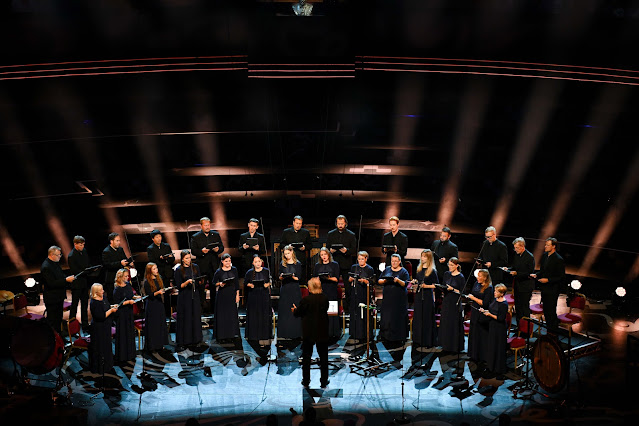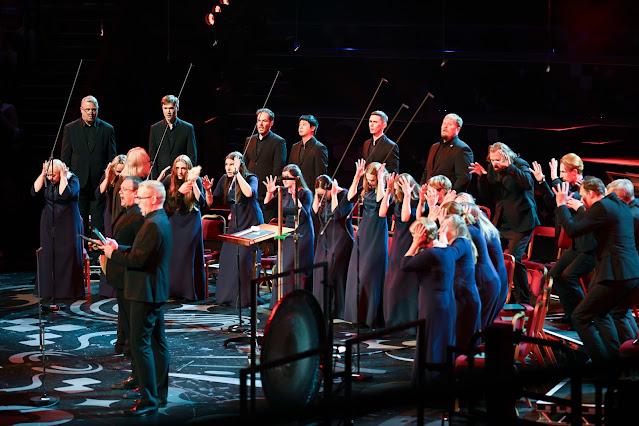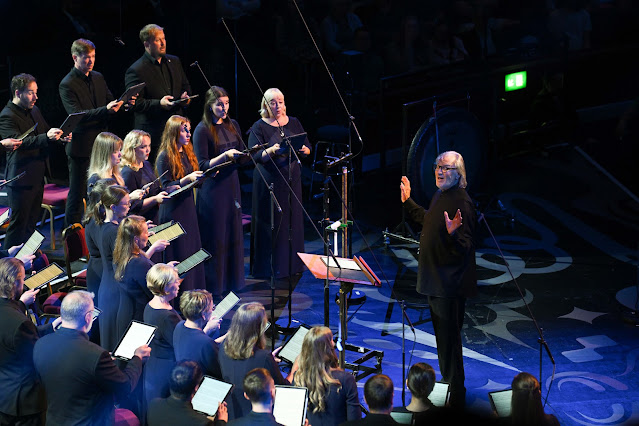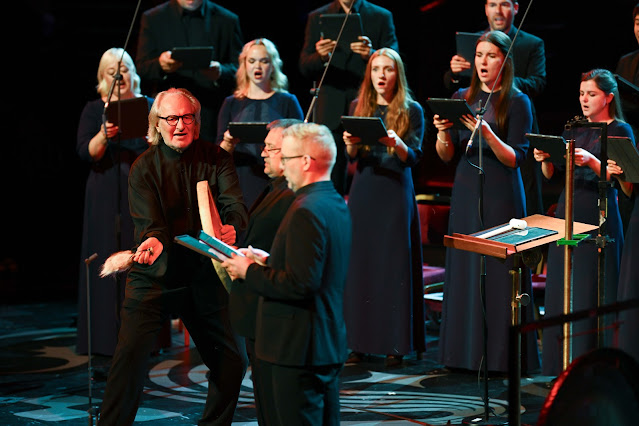 |
| Estonian Philharmonic Chamber Choir, Tõnu Kaljuste – BBC Proms at the Royal Albert Hall (Photo: BBC/Chris Christodoulou) |
Arvo Pärt, Galina Grigorjeva, Rachmaninov, Bach, Veljo Tormis; Estonian Philharmonic Chamber Choir, Tõnu Kaljuste, Kadri Toomoja; BBC Proms at the Royal Albert Hall
Reviewed 31 July 2025
An iconic Estonian ensemble celebrating the great Estonian composer’s 90th birthday with a wide-ranging programme of his music alongside that of contemporaries and influences.
This year Arvo Pärt is 90 and everyone is celebrating. At the BBC Proms, rather than including one of the composer’s larger scale works, the focus of the celebrations was a visit by the Estonian Philharmonic Chamber Choir which has had a long association with the composer’s music. I have heard the choir live before, in Tallinn, performing in the relatively grateful acoustics of a former church [see my review] and the large hall of Kultuurikatel (Cultural Cauldron), a former industrial building [see my review], whilst in 2018 as part of Estonia’s centenary celebrations they performed at the Barbican [see our review]. The vast spaces of the Royal Albert Hall are, perhaps, a less sympathetic arena but there is no doubt that an invitation to perform Arvo Pärt at such an iconic venue as part of the BBC Proms was a significant moment.
At the late night Prom on Thursday 31 July 2025, Tõnu Kaljuste conducted the Estonian Philharmonic Chamber Choir, with Kadri Toomoja organ, in Arvo Pärt’s Da pacem Domine, Veni creator, Magnificat, The Deer’s Cry, Fur Jan van Eyck, Peace upon you, Jerusalem and De Profunds, along with Galina Grigorjeva‘s Svyatki – ‘Spring is Coming’, two movements from Rachmaninov’s All-Night Vigil (Vespers), Bach’s motet Ich lasse dich nicht, and Curse upon Iron by Veljo Tormis who would have been 95 this year.
 |
| Veljo Tormis: Curse upon Iron – Estonian Philharmonic Chamber Choir, Tõnu Kaljuste – BBC Proms at the Royal Albert Hall (Photo: BBC/Chris Christodoulou) |
In the Royal Albert Hall there was less sense of the choir’s vibrant tone quality that you can appreciate in smaller venues, but throughout the evening there was an impressive strength to the performance, a muscular quality to set against the English style of Arvo Pärt choral singing. Though it is worth bearing in mind that the choir fielded around 27 singers. The BBC producers had obviously decided that as this was a late-night concert of Baltic minimalism, we ought to have a light show too. The pictures here do not quite do justice to the rather lurid light effects that accompanied some of the music.
We began with Da pacem domine (from 2004/2006) which was written for Jordi Savall’s period performance ensemble which helps put the work in context. Here the performance was strong and focused, there was a lovely definiteness to the choir’s performance, as if Arvo Pärt came naturally to them, the accuracy relaxed without making a point. This was true throughout the evening and I wished they had performed a work like the Seven Magnificat Antiphons where choirs sometimes exaggerate the accuracy of their approach to Pärt’s choral blocking. Veni Creator (from 2006) featured Kadri Toomoja on the Royal Albert Hall organ. This was not quite so successful, there seemed a tonal disjoint between the organ part and the fragments of voices that float over it.
Pärt’s setting of the Magnificat (from 1989) is one of his enduring masterpieces and here it received a performance that made the music seem so obvious, with disjuncts in the writing feeling so natural. It was a concentrated account of the work, with a firmness of purpose and great poise. This was followed by The Deer’s Cry, his setting of English words by St Patrick, written in 2007 for Louth Contemporary Music Society in Ireland. What I noticed was the lovely contrast between the fluidity of the soprano line and the crispness of the accompanying figure, yet that crispness had a naturalness to it too. Poised and concentrated, the performance grew to a stirring climax. This group of Pärt pieces ended with the most recent, Fur Jan van Eyck, Pärt’s 2020 reworking of the Agnus Dei from his Berliner Messe of 1990. The piece was commissioned in 2020 by the City of Ghent and was inspired by the recently restored altarpiece, Adoration of the Mystic Lamb in the cathedral. Again we had the organ with disjoint phrases floating their way across the organ texture.
 |
| Estonian Philharmonic Chamber Choir, Tõnu Kaljuste – BBC Proms at the Royal Albert Hall (Photo: BBC/Chris Christodoulou) |
Next came a short extract from the choir concerto, Svyati by the Ukrainian-born, Estonia-based composer Galina Grigorjeva. I have always enjoyed her music and this was a tempting fragment making you wish for more. Yena Choi was the soprano soloist in Spring is Coming, where the affecting solo line was supported at first by choral humming, before something more substantial developed yet all the while the piece remained wonderfully affecting.
Two movements from Rachmaninov’s All-Night Vigil followed. Here the choir sang with a light elegance, making not attempt to Russify the sound and simply reinventing the music in its own image. ‘Slava v vyshnikh bogu’ was light and fluid, almost aetherial with a lovely attention to detail. ‘Bororoditse Devo’ was quite intimate with an impressive firmness at the climax.
For many years the motet Ich lasse dich night was attributed to Bach’s son, Johann Christian, but it is now seen as an early motet by Bach (dating from 1713). Performed with chamber organ accompaniment it began light and affecting but with a dancing feeling towards the end.
Two more Arvo Pärt works followed, the first for women’s voices, the second for men and organ. Peace upon you, Jerusalem from 2002 was written for Estonian TV Girls’ Choir. Light and clear, and surprisingly melodic, there was an accuracy and naturalness to the performance. De Profundis from 1980 used men’s voice, organ and percussion to strong effect. Beginning dark and deep there was a hypnotic, ritual feel to the piece as it grew in strength, almost inexorable.
This formed an apt prelude to Veljo Tormis’ Curse upon Iron. This work dates from 1972 and was revised in 1991. It is written for tenor and bass soloists (here Toomas Tohert and Geir Luht), choir and shaman drum (played by the conductor, Tõnu Kaljuste who effectively used the drum to direct the choir). Tormis sets an ancient text from the Finnish epic, the Kalevala (translated into modern Estonian by August Annist) using authentic Estonian folk song to create an almost ritual incantation, with the middle section devoted to contemporary Estonian poetry by Paul-Eerik Rummo and Jaan Kaplinski describing the horrors of modern warfare.
 |
| Veljo Tormis: Curse upon Iron – Estonian Philharmonic Chamber Choir, Tõnu Kaljuste – BBC Proms at the Royal Albert Hall (Photo: BBC/Chris Christodoulou) |
The beginning and end were ritualistic, the soloists quasi-mutterings supported by choral mumblings that gradually developed. The music was compelling and inexorable, though I felt that the size of the auditorium somewhat blunted its impact. The middle section became remarkably free in its writing, with a vivid theatricality both to the music and to the performance creating a real intensity that continued when the opening material returned.
We ended with Arvo Pärt’s Vater Unser originally written for boy soprano in 2005. Here we heard it with soprano Yena Choi and Kadri Toomoja on piano. Gentle and affecting, yet a world away from the composer’s usual style. There was an encore, another gently affecting piece Estonian Lullaby (Kuss-Kuss, Kallike).
A major Estonian ensemble celebrating Estonia’s best-known composer at the BBC Proms was definitely cause for celebration and we were lucky enough to attend a reception preceding the concert given by the Ambassador of Estonia HE Mr Viljar Lubi, one of his last engagements in this post. We were not just celebrating Arvo Pärt and the ongoing work of the Arvo Pärt Centre, but also Veljo Tormis and there was plenty of talk too of the Estonian Song Festival which took place in Tallinn last month.
The concert is available on BBC Sounds
The blog is free, but I’d be delighted if you were to show your appreciation by buying me a coffee.
Elsewhere on this blog
- Baltic Tides: piano music by two important Baltic pianist composers, Lūcija Garūta & Ester Mägi makes for a marvellous, compelling disc – record review
- Frederick and his sister: music for Postsdam and Bayreuth created for Frederick the Great and Wilhelmine of Bayreuth – record review
- Passion project that deserves to be enjoyed: Alastair Penman’s The Last Tree – record review
- To honour the women by giving voice to their experience: pianist Deirdre Brenner introduces The Magdalene Songs – interview
- Satisfying all round: Opera Holland Park’s revival of its 2018 production of Verdi’s La traviata showcases a trio of fine principals – opera review
- Will definitely stay in the memory: Gweneth Ann Rand & Simon Lepper in Judith Weir’s woman.life.song at Wigmore Hall – concert review
- Style & substance: Ambroise Thomas’ Hamlet in Buxton is a rewarding musical & dramatic feast – opera review
- The ennui of modern life: Bernstein & Poulenc’s one-act operas from the 1950s in an intriguing double bill at Buxton International Festival – review
- Old-fashioned drama & a modern gloss: Cecilia Stinton directs Donizetti’s Lucia di Lammermoor at Opera Holland Park with Jennifer France – review
- A family affair: from a memorial to his father, Andrew Arceci’s Winchendon Music Festival has grown into a community enterprise – interview
- Home


.jpg?w=998&resize=998,665&ssl=1)






